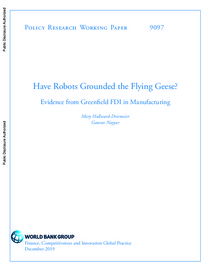Have robots grounded the flying geese? Evidence from greenfield FDI in manufacturing

Hallward-Driemeier, Mary ; Nayyar, Gaurav
World Bank - Washington, DC
2019
23 p.
automation ; robots ; globalization ; value chains ; relocation of industry ; manufacturing industry
Policy Research Working Paper
9097
Technology
http://hdl.handle.net/10986/33105
English
Bibliogr.
"For decades, manufacturers around the world have outsourced production to countries with lower labor costs. However, there is a concern that robotization in high-income countries will challenge this shifting international division of labor known as the "flying geese" paradigm. Greenfield foreign direct investment decisions constitute a forward-looking indicator of where production is expected, rather than trade flows that reflect past investment decisions. Exploiting differences across countries and industries, the intensity of robot use in high-income countries has a positive impact on foreign direct investment growth from high-income countries to low- and middle-income countries over 2004-15. Past a threshold, however, increased robotization in high-income countries has a negative impact on foreign direct investment growth. Only 3 percent of the sample exceeds the threshold level beyond which further automation results in negative foreign direct investment growth and is consistent with re-shoring. For another 25 percent of the sample, the impact of robotization on the growth of foreign direct investment is positive, but at a rate that is declining. So, although these are early warning signs, automation in high-income countries has resulted in growing foreign direct investment for more than two-thirds of the sample under consideration. Some geese may be slowing, but for now, most continue to fly."
Digital
The ETUI is co-funded by the European Union. Views and opinions expressed are however those of the author(s) only and do not necessarily reflect those of the European Union or the ETUI.